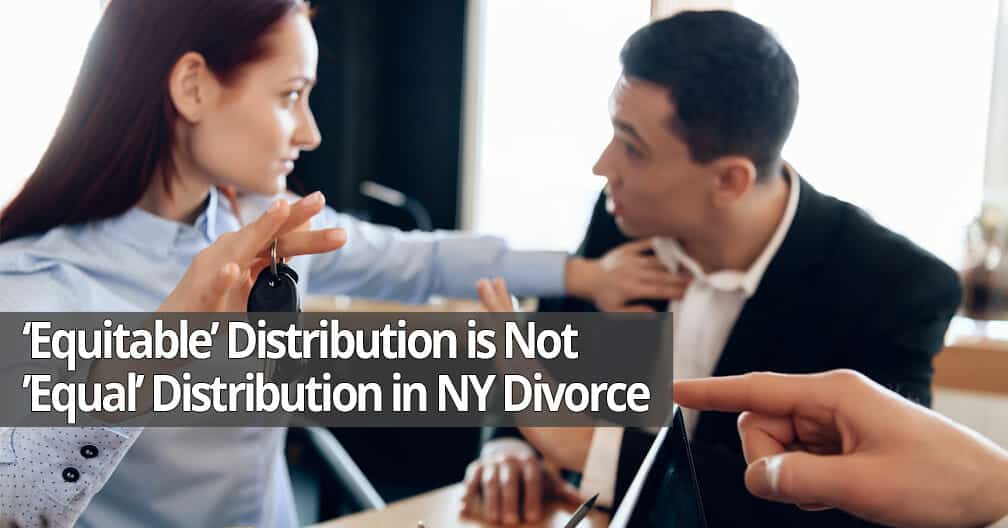Equitable Distribution is Not Equal Distribution in Long Island Divorce

For many clients getting a divorce on Long Island, one of the most important issues is the division of property. It’s important to recognize that in New York, property is divided equitably, not equally. Although the words sound similar, they can lead to incredibly different results in your Long Island Divorce.
Factors to be Considered in Equitable Distribution
Marital Property
For couples seeking a divorce on Long Island, it’s important to understand that marital property will be divided equitably. Simply put, marital property is everything owned by one or more spouses during the marriage. Money and other assets acquired during the marriage are presumed to be marital property.
How Courts Decide What is Marital Property
In order to equitably divide marital property, Long Island courts look to a number of statutory factors. Some of those factors include:
- The duration of the marriage
- Each spouse’s income and property during the marriage
- Each spouse’s contribution to the marriage
- Each spouse’s age and health
- Which spouse was awarded custody
- Whether maintenance was granted
- The liquidity of marital property
- The loss of inheritance and pension rights upon the dissolution of the marriage
Marital Fault is Not Considered When Dividing Property
This is a common question asked by many clients, especially if one spouse has had an affair. On Long Island, for purposes of equitable distribution, the courts will not consider marital fault, such as adultery or abandonment. Domestic violence and criminal activities will also not be considered, as long as it did not affect the couple’s finances.
Separate Property
For purposes of equitable distribution, each spouse’s separate property will not be considered for equitable distribution. Separate property consists of the assets that were acquired by each spouse prior to the marriage, as well as any gifts and inheritances you individually acquired, even if acquired during the marriage.
If separate property is exchanged for new personal property during the marriage, that new property is typically also considered separate property. If, for example, you own a boat prior to the marriage, and then, after you marry your spouse, you sell that boat to purchase a new one, as long as no marital funds are additionally used to purchase the new boat, it’s considered separate property.
Comingling of Marital and Separate Property
During your Long Island Divorce, it’s very important to show that no commingling of separate property with marital property has occurred. If commingling has happened, that separate property can be transformed into marital property.
Have More Questions About Equitable Distribution? Contact Us at 631-923-1910
If you are in the process of a Long Island Divorce, or, are considering beginning the process, equitable distribution will play a big role. It’s important that you have an experienced Long Island Divorce Attorney by your side along the way. We can help. Contact our Long Island Divorce & Family Law firm at 631-923-1910 to set up your free consultation and case evaluation with one of our experienced Family Law attorneys.
For more information about Property Division in your divorce, visit our Complete Guide to Dividing Property in Divorce.
See this page for Your Guide to Preparing for a Contested Divorce.
SCHEDULE YOUR FREE CONSULTATION TODAY
Call 631-923-1910 or fill in the form below
Schedule your complimentary consultation and case evaluation with our experienced attorneys today. When you call, you’ll speak to our friendly Client Services Director, who will be able to answer your general questions and set up your appointment with an attorney who specializes in your unique case.
At your meeting, your attorney will describe the many options available and determine together which is the right solution for you. By the end of this meeting we’ll all understand how we can best help you to move forward.
No Cost or Obligation
There is no cost or obligation for this initial consultation. It is simply an opportunity for us to get to know each other, answer your questions and learn if Hornberger Verbitsky, P.C. is right the right law firm for you. Give us a call at 631-923-1910 or fill in the short form below to schedule your free consultation and case evaluation.
All Fields Are Required